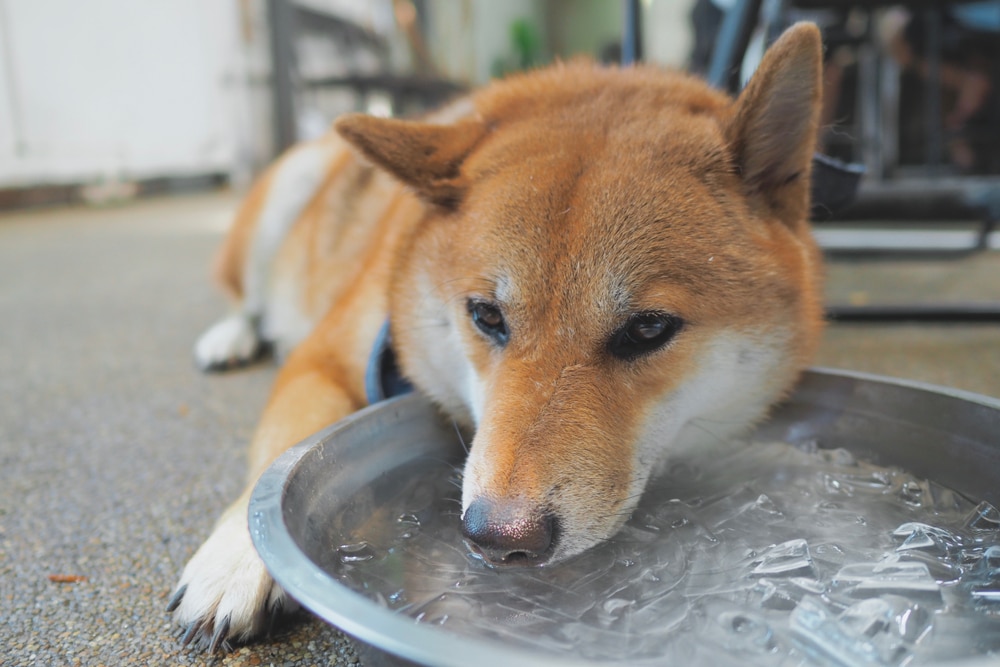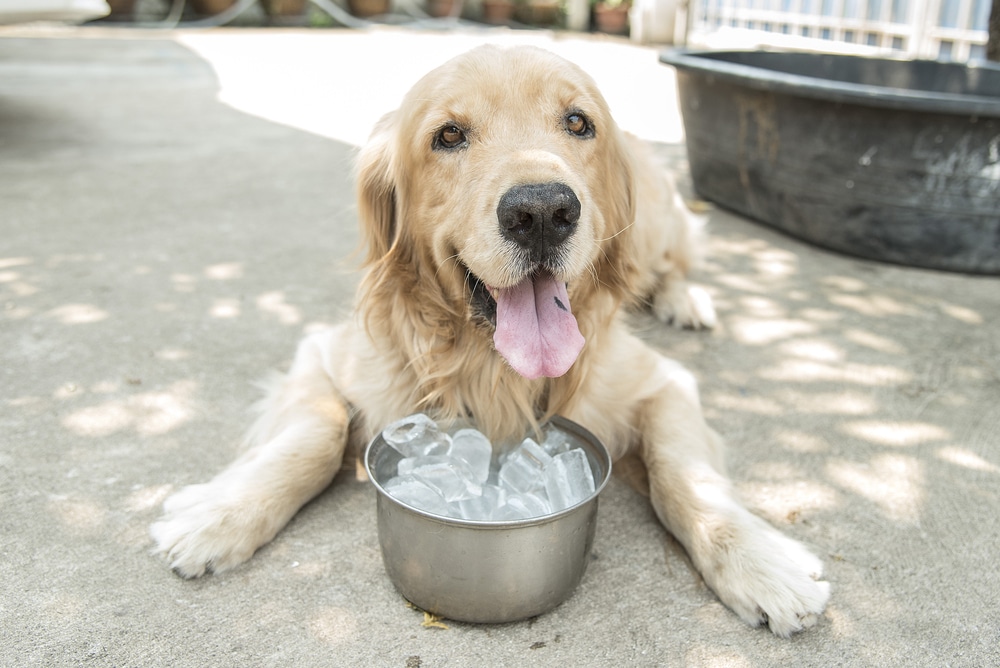Feeling a cool sensation between your teeth can be highly satisfying, and it’s something our four-legged pals also enjoy. But is crunching on ice cubes safe for dogs? Do dogs actually crave icy treats just like their human counterparts?
Dogs can enjoy eating ice just like humans do. During the sultry summer days, offering your pup ice can be a fun way to keep them cool. Whether it’s cubes or crushed chunks, dogs adore icy snacks! Not only does it chill their palate, but its crunchy texture provides entertainment and helps reduce body temperature swiftly to avoid overheating. Dogs are sure to love this refreshing popsicle-like treat!
Table of Contents
Could Ice Prove Detrimental To Your Dog’s Teeth?
Hard objects are notorious causes of tooth breakage in dogs. Constantly gnawing on hard objects can damage your dog’s tooth enamel. The bigger and more solid the cube is, the more significant potential for fracturing teeth that exists.
If you observe that your dog has a penchant for chewing ice cubes, give them crushed ice rather than large chunks of it. These tiny pieces will dissolve more quickly and thus minimize the risk of harm to their teeth. To make sure your dog is extra safe, provide them with regular cold water instead!
Is Ice An Effective Solution For Dogs Suffering From Heat Stroke?
Absolutely not! Ice should never be used to treat a dog’s heatstroke. The consequences could be disastrous. Attempting to cool down an overheated pup requires extreme caution, as ice can cause their body temperature to drop too rapidly, potentially leading to conditions such as shock.
We suggest cooling your pup with cool (not cold or frozen) water for the best results. Start by lightly dampening their underside and back–avoiding their head–with room temperature water and then hit the vet immediately.
Do All Dog Breeds Enjoy Ice?
Yes, all breeds of dogs can enjoy eating ice. But you should always be aware of their individual preferences and digestive capabilities. Whether large, small, or medium sizes, all breeds of dogs may enjoy chewing on ice cubes. Yet it is commonly known that larger and more active canines tend to chew more as a rule.
Opt for crushed ice instead of cubes if you own a smaller breed like Dachshunds or Yorkies. This way, they’ll be easier to nibble on without the risk of chipping their teeth. Monitor the size of the pieces they’re munching on and take extra caution to avoid any health risks associated with broken teeth or digestive issues.
5 Reasons Why Dogs Like Ice

Ice is a surprisingly refreshing treat for your dog, and there are quite a few reasons why they like it, including the following.
Beat The Heat With Delicious Refreshments!
On hot days, dogs keep cool by panting, taking refuge in the shade, and drinking plenty of water. But why not give your pup an extra special treat to beat the heat? Frozen treats are a tasty way for your pet to stay properly hydrated and enjoy some much-deserved refreshment!
Although these little luxuries can be a fun addition to their day, remember that providing ample water and finding shady spots outdoors is ultimately best when temperatures become too extreme.
Hours Of Chewing Pleasure And Stress-Free Relaxation
Chewing is an essential and intuitive activity for dogs. Even their relatives in the wild are known to play with bones! Whether it’s a stick or your favorite shoes, most pups enjoy chomping down on whatever they can get their paws on. Chewing helps them strengthen their jaws and teeth, and many dogs do it because it feels good.
Some dogs may chew to help reduce their stress levels. This is a natural form of emotional self-regulation for them. Ice provides an enjoyable way for your pup to cool off during these times. With this activity, your dog can easily calm down!
An Abundance Of Inquisitive Entertainment
Dogs use their heightened sense of smell as the primary way to explore and understand new objects, places, and people. So, when your pup licks or nips at an ice cube for no apparent reason, don’t be surprised! Dogs have much fewer taste buds (around 7,000) than humans do. They’re simply investigating their environment in a unique manner.
Refreshment To Remember
To stay hydrated, dogs need significantly more water than you may expect, around ⅛ cup for each pound per day. Their tongues have specialized taste receptors that react particularly to water and become stimulated when a dog is hungry or thirsty.
For dogs, ice is a delightful and refreshing snack and provides health benefits. Think of them like the delectable popsicles you so enjoyed in your childhood! Not to mention these frosty treats guarantee your pup has enough hydration throughout the day.
Delightful Delicacies From All Sides
Dogs need to be kept stimulated to stay healthy and happy. Apart from physical exercise, they also crave mental stimulation, like observing interesting objects or interacting with something new around them.
Ice licking, crunching, and biting all help satisfy that craving while providing hours of entertainment. And as we know, water is also essential in keeping your pup fit and healthy.
Is It Risky To Offer Your Dog Ice Cubes?
In general, offering your dog an occasional ice treat is perfectly safe. Nonetheless, you should be aware of certain health hazards associated with ice cubes for dogs.
Jaw Injuries
Supervise them when they’re crunching on these goodies, and take extra precautions with bigger breeds. Their powerful jaws can easily break down the cubes into sharp pieces that could injure their mouths.
Avoid giving your pup overly large cubes or any made with salt or sugar. These can be dangerous if ingested in large quantities.
Choking Hazards
Ice cubes can be a choking hazard for dogs if not given in the appropriate size for their breed. When dogs consume large ice cubes, it can be dangerous if ingested in large quantities.
To prevent any choking hazards, provide them with appropriate-sized cubes.
In Conclusion: Do Dogs Like Ice?
Dogs love ice! Its refreshing taste and stimulating effect make it an ideal treat for hot summer days. Consult your veterinarian before introducing new foods or treats into your dog’s diet. Then, treat your pup to an icy snack. They deserve it!
So, do you plan on treating your dog to some ice? Let us know your thoughts and why in the comments below!
